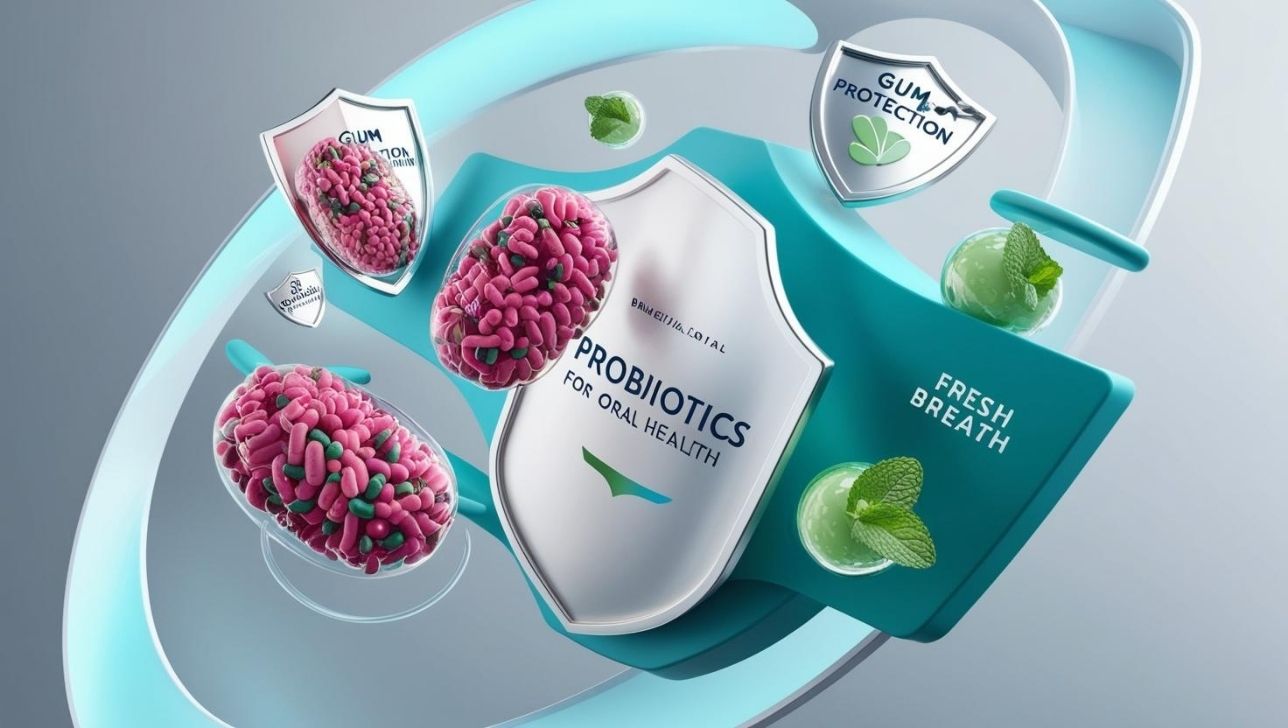The Role of Dental Probiotics in Enhancing Oral Health
Oral health is crucial for overall wellness, and maintaining it involves more than just brushing and flossing. While traditional methods are effective, there’s a new frontier in oral care that focuses on enhancing the balance of bacteria in your mouth—dental probiotics. These beneficial microorganisms can play a significant role in improving your oral hygiene and preventing various dental issues.
Dental probiotics work by introducing good bacteria into your mouth. This helps to crowd out harmful bacteria, reducing the risk of cavities, gum disease, and bad breath. Unlike antibiotics, which kill both good and bad bacteria, probiotics target only the harmful bacteria, leaving the beneficial ones intact. This selective action helps maintain a healthy balance in your oral microbiome.
Is ProDentim really worth it? Click to see the full review!
Understanding the Oral Microbiome
Your mouth is home to a diverse community of microorganisms, including bacteria, viruses, and fungi. Collectively, these form the oral microbiome. A balanced microbiome is essential for maintaining oral health. When harmful bacteria dominate, it can lead to issues like tooth decay, gum disease, and even systemic health problems. Dental probiotics aim to restore and maintain this balance by increasing the population of beneficial bacteria.
Common Types of Beneficial Bacteria in Dental Probiotics
- Lactobacillus reuteri: Known for its ability to reduce levels of Streptococcus mutans, a bacterium that causes tooth decay.
- Lactobacillus rhamnosus: Helps prevent the adhesion of harmful bacteria to teeth and gums, reducing the risk of cavities and gingivitis.
- Bifidobacterium lactis: Supports overall gut health, which in turn can influence oral health positively.
- Streptococcus salivarius: Produces antibacterial substances that inhibit the growth of harmful pathogens in the mouth.
Benefits of Using Dental Probiotics
Using dental probiotics can offer several benefits beyond just fresher breath and cleaner teeth. Here are some key advantages:
| Benefit | Description |
|---|---|
| Reduction in Cavities | Probiotics help decrease harmful bacteria that cause tooth decay, leading to fewer cavities. |
| Improved Gum Health | The introduction of beneficial bacteria can help reduce inflammation and promote healthier gums. |
| Fresher Breath | By balancing the oral microbiome, probiotics can help eliminate the root causes of bad breath. |
| Enhanced Immune Response | A healthy oral microbiome can strengthen the body’s immune response against oral infections. |
| Reduced Risk of Oral Diseases | Probiotics can lower the risk of developing conditions like periodontitis and oral thrush. |
How to Incorporate Dental Probiotics into Your Routine
Dental probiotics into your daily routine is simple and can be done in several ways:
- Chewable Tablets: Many dental probiotic products come in the form of chewable tablets. Simply chew and allow them to dissolve in your mouth.
- Mouth Sprays: These sprays are designed to coat the entire mouth, providing a broad coverage of beneficial bacteria.
- Gels: Some dental probiotics are available in gel form, which can be applied directly to the teeth and gums.
- Toothpaste: There are toothpaste brands that incorporate probiotics into their formulations, making it easy to integrate them into your brushing routine.
Choosing the Right Dental Probiotic Product
When selecting a dental probiotic product, consider the following factors:
- Strain Diversity: Look for products that contain multiple strains of beneficial bacteria, as this provides a broader range of health benefits.
- Efficacy Studies: Choose products backed by scientific research demonstrating their effectiveness in improving oral health.
- Certifications: Opt for products certified by reputable organizations, ensuring they meet high standards of quality and purity.
- Customer Reviews: Read reviews from other users to gauge the effectiveness and reliability of the product.
Potential Side Effects and Precautions
While generally safe, some individuals may experience mild side effects when starting to use dental probiotics. These can include:
- Temporary changes in taste
- Occasional dry mouth
- Minor digestive discomfort
If you have a compromised immune system or are undergoing certain medical treatments, consult with your healthcare provider before using dental probiotics.
Combining Dental Probiotics with Traditional Oral Care
To maximize the benefits of dental probiotics, it’s important to combine them with traditional oral care practices. Regular brushing and flossing, along with professional dental cleanings, complement the work of probiotics by removing plaque and debris. This holistic approach ensures that your mouth remains healthy and free from harmful bacteria.
Long-Term Benefits of Using Dental Probiotics
Consistent use of dental probiotics over time can lead to several long-term benefits:
- Stronger Teeth: Reduced bacterial activity can lead to stronger enamel and fewer cavities.
- Healthier Gums: Improved gum health reduces the risk of periodontal diseases.
- Better Overall Health: A healthy oral microbiome contributes to better overall health, potentially lowering the risk of systemic conditions linked to poor oral health.
Final Thoughts
Dental probiotics represent a promising addition to your oral hygiene routine. By promoting a healthy balance of bacteria in your mouth, they can help reduce the risk of common oral health issues and contribute to better overall wellness. Whether through chewable tablets, sprays, gels, or toothpaste, incorporating dental probiotics into your daily regimen can be a simple yet effective way to enhance your oral health.
Comparing Traditional Oral Hygiene Methods with Probiotic Solutions
When it comes to maintaining good oral hygiene, traditional methods like brushing and flossing have been the cornerstone of dental care for decades. However, the introduction of dental probiotics offers a new dimension to this age-old practice. Let’s explore how these two approaches compare in terms of effectiveness, convenience, and overall impact on oral health.
To better understand the differences, let’s look at a comparison chart:
| Aspect | Traditional Oral Hygiene | Dental Probiotics |
|---|---|---|
| Primary Method | Brushing and Flossing | Consumption of Probiotic Supplements |
| Frequency | Daily (at least twice) | Daily (once or twice) |
| Effectiveness Against Plaque | Highly Effective | Moderately Effective |
| Effectiveness Against Bad Breath | Effective | Effective |
| Effectiveness Against Gum Disease | Effective | Moderate to High |
| Cost | Moderate (toothbrush, toothpaste, floss) | Moderate to High (probiotic supplements) |
| Convenience | Requires Manual Effort | Easier to Incorporate into Daily Routine |
| Impact on Oral Microbiome | Limited | Positive |
Effectiveness Against Plaque
Brushing and flossing remain the gold standard for removing plaque from teeth. These methods physically scrub away the buildup, reducing the risk of cavities and gum disease. On the other hand, dental probiotics work by introducing beneficial bacteria that compete with harmful ones, thus reducing the overall plaque formation. While dental probiotics are effective, they might not match the immediate mechanical action of brushing and flossing.
Effectiveness Against Bad Breath
Bad breath, or halitosis, can often be traced back to poor oral hygiene. Both traditional methods and dental probiotics are effective in combating bad breath. Brushing removes food particles and bacteria that cause odor, while probiotics help restore the balance of bacteria in the mouth, which can also reduce odor-causing bacteria.
Effectiveness Against Gum Disease
Gum disease is a serious condition that affects the tissues supporting the teeth. Brushing and flossing are crucial in preventing and managing gum disease. They remove plaque and tartar that can lead to inflammation and infection. Dental probiotics, while not as immediately effective as brushing and flossing, can still play a significant role by promoting a healthy oral microbiome, which supports overall gum health.
Cost Considerations
The cost of traditional oral hygiene methods includes the initial purchase of a toothbrush, toothpaste, and floss. These items are generally affordable and can last for several months. Dental probiotics come in the form of supplements, which can be more expensive. However, their convenience and potential long-term benefits may justify the higher cost for some individuals.
Convenience Factor
Brushing and flossing require manual effort and time, which can sometimes be challenging for people with busy schedules. Dental probiotics offer a simpler solution; they can be taken daily with minimal effort, making them a convenient addition to one’s routine. This ease of use can encourage consistent use, potentially leading to better long-term oral health.
Impact on Oral Microbiome
The traditional approach to oral hygiene focuses primarily on removing bacteria rather than balancing them. Dental probiotics, however, aim to restore and maintain a healthy balance of bacteria in the mouth. By introducing beneficial strains, they can help prevent the overgrowth of harmful bacteria, contributing to a healthier oral environment.
Combining Approaches
For optimal oral health, many experts recommend combining traditional methods with dental probiotics. This dual approach leverages the strengths of both techniques, providing a comprehensive strategy to combat common oral health issues. For instance, regular brushing and flossing can be complemented by taking a probiotic supplement once or twice a day.
Final Thoughts
Both traditional oral hygiene methods and dental probiotics offer unique benefits in maintaining oral health. While brushing and flossing remain essential for immediate results, dental probiotics provide a supportive role by enhancing the overall balance of bacteria in the mouth. By integrating both approaches, individuals can achieve a more holistic and effective oral care regimen.
Take care of your teeth and gums effortlessly – Buy ProDentim now!
Conclusion
Understanding the role of dental probiotics in enhancing oral health opens up new possibilities for maintaining a healthy mouth. Unlike traditional methods that often focus solely on removing bacteria, probiotics work by balancing the microbial ecosystem in your mouth. This balance can lead to fewer cavities, healthier gums, and fresher breath. When compared to conventional approaches like brushing and flossing, probiotics offer a complementary solution that strengthens your defenses against harmful bacteria. By incorporating dental probiotics into your daily routine, you’re not just cleaning your teeth; you’re nurturing a balanced oral environment. This shift towards holistic oral care can significantly improve your overall dental health, making it easier to maintain a bright, confident smile. Consider trying dental probiotics today to experience the difference for yourself.


